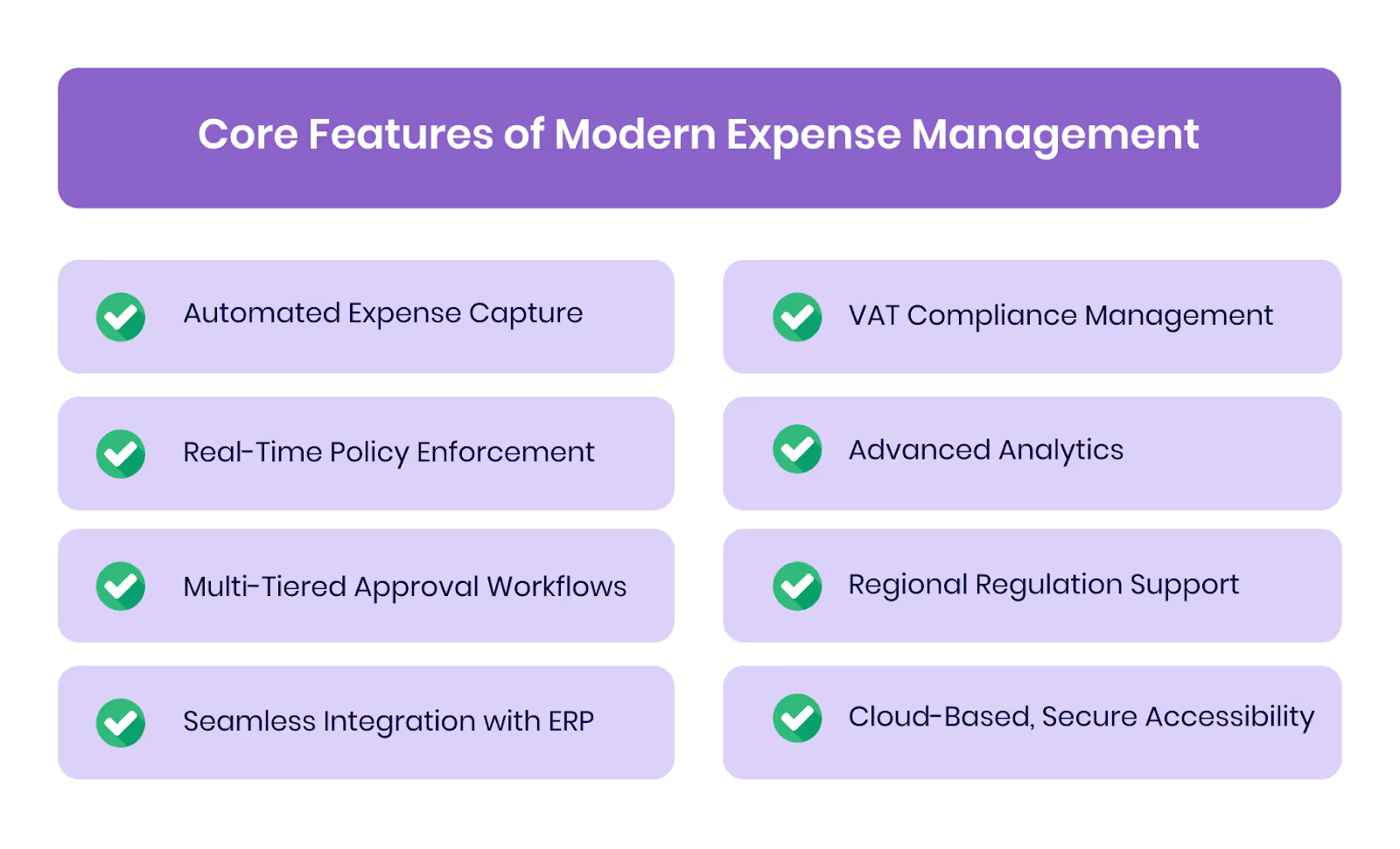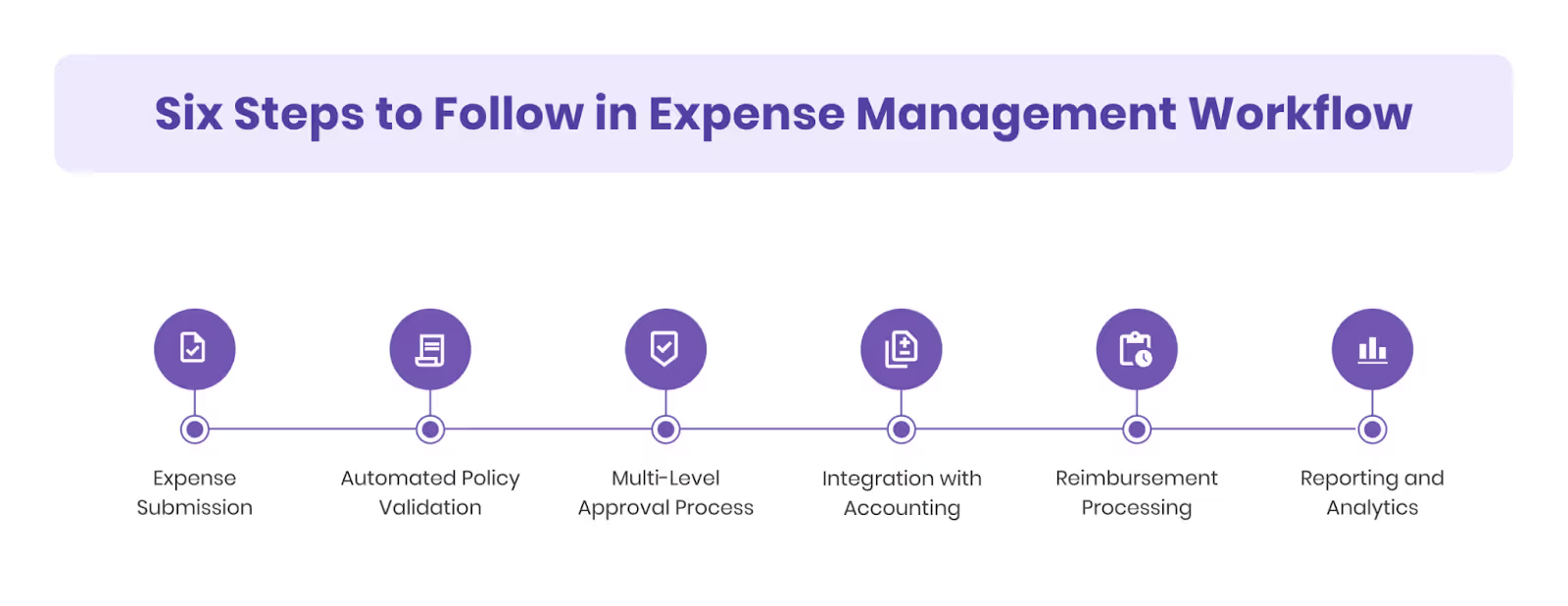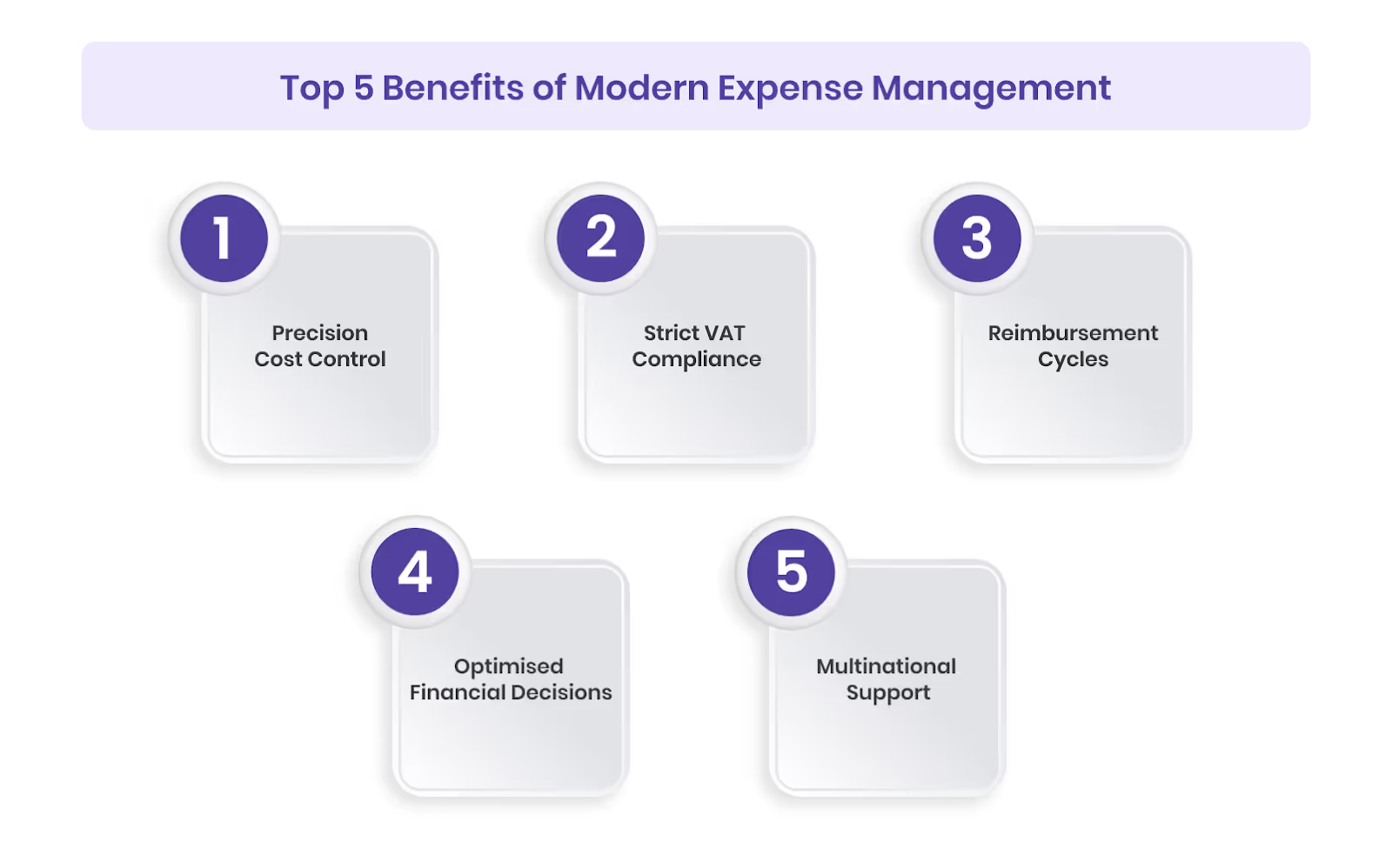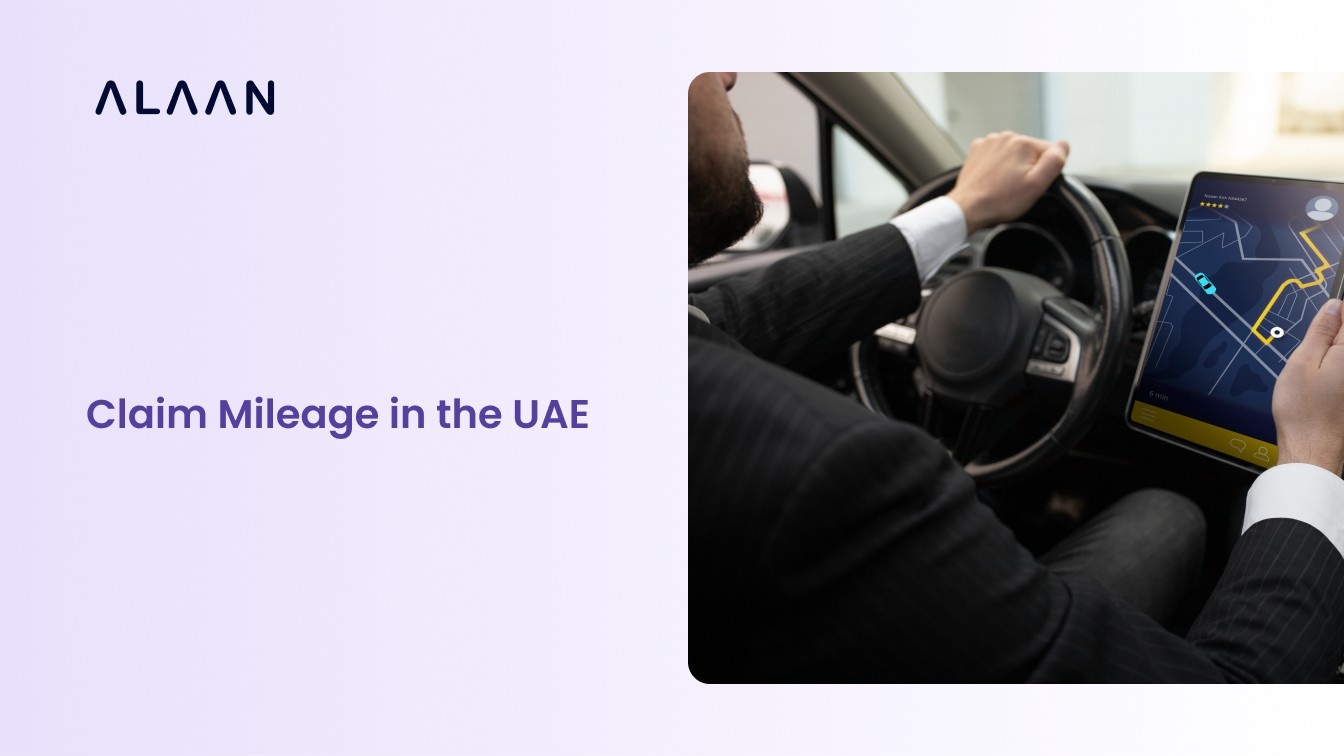Escalating expense fraud, compliance gaps, and process inefficiencies are costing UAE companies millions each year. Global research from the Association of Certified Fraud Examiners shows organisations lose an average of 5% of annual revenue to fraud, with expense claim abuse ranking among the most common causes.
Manual expense tracking compounds these losses, increasing VAT reporting errors and slowing decision-making. Modern expense management replaces outdated processes with automated controls and precision reporting, critical for regulatory compliance.
This blog helps finance leaders through modern expense management practices, demonstrating how automation and clear policies reduce costs and elevate operational efficiency.
Key Takeaways
- Modern expense management tools use real‑time tracking, policy enforcement, and ERP integration to reduce manual errors, fraud, and approval delays.
- Strong reimbursement policies safeguard profitability and ensure alignment with VAT & tax laws.
- Data‑driven analytics transform raw expense data into actionable cost‑optimisation strategies.
- AI, ESG‑linked tracking, and mobile‑first systems are shaping the future of expense governance in the GCC.
What is Modern Expense Management?
Modern expense management is a comprehensive, tech-based approach to managing business expenses, encompassing the capture, approval, reimbursement, and reporting of expenses across an organisation.
It replaces traditional, manual methods with automated systems that enhance accuracy, transparency, and regulatory compliance. Unlike generic expense tracking, modern expense management integrates real-time data capture, predefined policy enforcement, and seamless integration with accounting and ERP systems, ensuring expenses are validated, authorised, and logged correctly.
Key expense types managed within these systems include:
- Travel and Accommodation: Flights, hotels, and local transport for business trips.
- Subsistence: Meals and daily allowances incurred during work-related travel.
- Office Supplies and Equipment: Purchases of materials and technology for business use.
- Entertainment and Client Relations: Expenses related to client meetings or corporate hospitality.
- Miscellaneous Operational Costs: Parking, tolls, mobile and communication expenses tied to business operations.
After understanding the basics of a modern expense management solution, let's have a look at the specific capabilities that define advanced systems and differentiate them from traditional approaches.
[cta-3]
Core Features of Modern Expense Management

Modern expense management solutions offer a suite of detailed, technology-driven features explicitly designed to address the operational, compliance, and financial control challenges faced by UAE businesses.
Key components include:
- Automated Expense Capture and Submission: Utilises mobile apps and OCR (Optical Character Recognition) to automatically extract data from receipts and invoices, eliminating manual entry errors and speeding up submission timelines.
- Real-Time Policy Enforcement: Expenses are immediately validated against company-specific rules and UAE VAT laws during entry, automatically flagging or rejecting non-compliant claims to reduce risks of fraud or non-conformance.
- Multi-Tiered Approval Workflows: Customisable authorisation paths ensure that expenses are reviewed and approved at necessary levels, providing accountability and control without causing process delays.
- Seamless Integration with ERP and Accounting Software: Expense data synchronises directly with core financial systems, reducing reconciliation effort, minimising human error, and accelerating month-end closing processes.
- Comprehensive VAT Compliance Management: Automatically verifies VAT invoices, facilitates correct VAT reclaim procedures, and keeps detailed audit trails essential under UAE Federal Tax Authority regulations.
- Advanced Analytics and Spend Reporting: Offers dashboards and reports that analyse expenditure patterns, flag anomalies indicative of potential fraud, and support budgeting and forecasting decisions.
- Multi-Currency and Regional Regulation Support: Supports businesses operating across the UAE and the wider GCC, handling multiple currencies and compliance with diverse regulatory environments effortlessly.
- Cloud-Based, Secure Accessibility: Enables expense management teams and employees to submit, review, and audit expenses remotely with high standards of data security and privacy in line with UAE data protection laws.
To understand why investing in modern expense management is vital, it is essential to recognise its direct impact on the financial health and regulatory compliance of UAE businesses.
[cta-4]
The Importance of Expense Management
Effective expense management allows organisations to safeguard revenue, ensure compliance with stringent UAE VAT and corporate tax laws, and optimise operational efficiency.
Beyond financial protection, modern expense management promotes transparency and accountability across all levels of expense submission and approval. It reduces costly delays by streamlining workflows through automation and ensures employees adhere to clearly defined reimbursement policies, which mitigates the risk of policy breaches and non-compliance.
Key reasons why expense management is crucial for UAE businesses include:
- Fraud and Error Reduction: Manual processes leave room for error and abuse; comprehensive systems detect anomalies early to protect vital revenue streams.
- VAT Compliance Assurance: Proper verification of VAT invoices and automatic tax calculations prevent costly misfiling and penalties under UAE FTA rules.
- Streamlined Financial Reporting: Real-time expense data integration accelerates month-end closing and improves audit readiness.
- Operational Efficiency: Automating submissions and multi-level approvals saves time and reduces administrative overhead.
- Improved Policy Adherence: Clear, enforced reimbursement policies enhance compliance and control spending behaviour.
- Strategic Spend Analytics: Detailed reports allow CFOs to identify cost-saving opportunities and optimise resource allocation.
- Cross-Border and Multi-Currency Handling: Supports businesses operating in multiple jurisdictions within the GCC with currency conversions and regulatory nuances.
To appreciate the value of modern expense management, it is important to contrast it with traditional methods.
The Traditional Versus Modern Way of Managing Expenses
Historically, expense management in businesses, including those in the UAE, relied heavily on manual processes such as paper receipts, Excel spreadsheets, and physical approval signatures.
These methods were prone to errors, delays, and limited transparency, often resulting in compliance risks, fraud potential, and inefficiencies. Modern expense management replaces these outdated practices with automated, integrated systems crafted to meet the unique regulatory and operational demands of contemporary UAE businesses.
Below is a detailed comparison emphasizing key distinctions between traditional and modern expense management approaches relevant to UAE enterprises:
Building on the transformative benefits of modern expense management, the next critical step for businesses is mastering an efficient and compliant expense management workflow.
Six Steps to Follow in Expense Management Workflow

An optimised expense management workflow ensures consistent processing from expense submission through to reporting, minimising compliance risk and maximising operational efficiency.
Below is a detailed, step-by-step guide tailored for businesses to uphold regulatory standards such as VAT compliance while maintaining financial control:
1. Expense Submission
Employees submit expenses digitally, typically through mobile or web apps, attaching receipts and relevant documentation. Digital capture with OCR technology ensures data accuracy and reduces manual loading errors commonly seen in traditional methods.
2. Automated Policy Validation
Immediately upon submission, expenses are evaluated through sophisticated rule engines that apply multi-criteria checks, including:
- Conformity with company reimbursement policies (limits, allowable categories).
- Verification of VAT invoice authenticity per UAE FTA guidelines, including mandatory fields such as TRN.
- Detection of duplicate claims, missing receipts, or out-of-policy spend. Flagged expenses trigger automatic alerts, reducing manual intervention.
3. Multi-Level Approval Process
Expenses follow a specific approval path determined by expense type, amount, or employee role. Typically, low-value claims require immediate line manager approval, while higher-value or unusual claims escalate to compliance officers.
Automated notifications and deadline tracking reduce bottlenecks. All approvals are digitally signed with audit trails for complete transparency and regulatory compliance, supporting internal controls and external audits.
4. Integration with Accounting/ERP Systems
Approved expenses are synchronised in real time with accounting software or ERP platforms. This eliminates duplicated data entry, accelerates month-end closes, and ensures consistent financial records aligned with corporate tax and VAT reporting requirements.
5. Reimbursement Processing
Cleared expenses proceed to reimbursement through integrated payment systems linked to payroll or dedicated finance disbursement platforms. Payments adhere strictly to company timelines to sustain employee satisfaction and compliance with labour law practices. Automated notifications inform employees of reimbursement status, and digital records ensure reconciliation consistency.
6. Expense Reporting and Analytics
The final stage involves analysing consolidated expense data through custom dashboards, providing finance leaders with:
- Detailed spend categorisation and trend analysis.
- Compliance tracking aligned with FTA VAT audit requirements.
- Identification of unusual or high-risk transactions through anomaly detection algorithms.
- Real-time budget consumption monitoring supporting proactive financial decisions. These insights enable continuous refinement of expense policies, risk mitigation, and enhanced financial governance.
After the detailed understanding of the expense management workflow, it is essential to explore best practices that UAE businesses must adopt to transform their expense management process into a compliant, controlled, and operationally excellent one.
5 Best Practices to Transform Expense Management
A well-structured expense management strategy is no longer a back-office function; it is a core driver of compliance, cost control, and financial agility for UAE businesses. By embedding the right policies, technology, and oversight mechanisms, organisations can reduce leakage, improve VAT compliance, and strengthen governance.
To achieve these outcomes, the following best practices offer a proven framework that will help finance leaders shift from reactive cost tracking to proactive expense control.
1. Implement Strict, Detailed Reimbursement Policies Aligned with UAE Regulations
Develop comprehensive policies that define allowable expenses, submission deadlines, and required documentation, explicitly incorporating VAT compliance rules set by the Federal Tax Authority (FTA). Clear policies reduce ambiguity, minimise fraudulent claims, and provide a concrete framework for automated rule enforcement and audit readiness. Regularly update policies to reflect changes in tax laws and business needs.
2. Use Automation and Mobile-First Technology for Expense Capture and Submission
Adopt expense management solutions that utilise mobile apps with OCR technology for real-time receipt capture and data extraction. Automation reduces manual errors, accelerates submission workflows, and ensures complete, accurate expense records supporting VAT recovery. Mobile accessibility facilitates timely submissions, crucial for maintaining VAT input tax eligibility.
3. Design Multi-Level, Role-Based Approval Workflows with Embedded Compliance Checks
Configure approval processes that route expenses based on cost centres, amounts, and employee roles to ensure proper authorisation lines. Embedding compliance checks at each approval step prevents policy violations and optimises accountability. Automate notifications and escalation protocols to maintain process velocity, avoiding bottlenecks that delay reimbursements and data integration.
4. Integrate Expense Management with Financial Systems for Seamless Data Synchronisation
Ensure your expense platform integrates tightly with ERP and accounting systems to enable automatic posting of approved expenses, full VAT tracking, and error-free reconciliation. This integration improves financial reporting accuracy, facilitates timely VAT filings, and reduces manual workload on finance teams, boosting overall operational efficiency.
5. Utilise Advanced Analytics and Continuous Monitoring for Proactive Control
Employ dashboards and analytics tools that provide granular visibility into spending patterns, policy adherence, and anomaly detection. Regularly analyse expense data to identify cost-saving opportunities, emerging compliance risks, and trends that inform policy refinement. Continuous monitoring supports audit preparedness and strategic financial planning aligned with the UAE's regulatory framework.
Let's now understand the concrete advantages of modern expense management, which further underscores its strategic value for UAE businesses to control costs and uphold compliance.
Top 5 Benefits of Modern Expense Management

Here are the top 5 benefits of modern expense management, tailored explicitly for UAE businesses, presented with clear, precise insights:
1. Precision Cost Control and Fraud Prevention
Advanced systems deliver real-time expense tracking with automated policy enforcement, drastically reducing the risk of fraudulent claims and human error. UAE firms can prevent losses that otherwise account for up to 5% of annual revenue, ensuring tighter cash flow control and protecting profit margins in a highly competitive market.
2. Strict VAT Compliance and Audit Preparedness
Automation verifies VAT invoices against Federal Tax Authority (FTA) requirements, maintaining accurate tax records and audit trails. This reduces exposure to expensive VAT penalties and streamlines regulatory audits, a critical factor within the UAE’s evolving tax regime.
3. Efficiency in Approval and Reimbursement Cycles
Digitally enabled multi-tiered workflows accelerate the submission, review, and reimbursement of expenses. This mitigates administrative backlogs, boosts employee satisfaction through timely payments, and frees finance teams to focus on higher-value activities.
4. Insightful Analytics for Optimised Financial Decisions
Modern platforms provide granular visibility into expenditure patterns and budget adherence, enabling finance leaders to detect anomalies promptly and uncover cost-saving opportunities. Data-driven insights empower CFOs to make strategic financial decisions tailored to the UAE business environment.
5. Seamless System Integration and Multinational Support
Expense data integrates directly with ERP and accounting systems, ensuring consistency and facilitating faster month-end close processes. Support for multiple currencies and local GCC VAT rules is invaluable for UAE companies operating regionally, simplifying cross-border expense management and compliance.
Alaan is a UAE-based fintech that exemplifies this transformation by addressing the specific needs and challenges of Middle Eastern businesses through advanced technology and local market expertise.
How Alaan Transforms the Modern Expense Management System
Alaan offers an integrated, AI-powered expense management platform designed to address the unique regulatory and operational challenges faced by UAE businesses. By combining smart corporate cards, automated expense tracking, and seamless accounting integration, Alaan delivers comprehensive control and visibility over company spending in real time.
Key transformational aspects include:
- Smart Corporate Cards with Precise Controls: Alaan issues both physical and virtual corporate cards instantly, allowing businesses to set customised spend limits, merchant restrictions (e.g., fuel stations), and multi-currency capabilities.
- AI-based Expense Capture and Automation: The platform uses artificial intelligence to auto-extract expense details from receipts, including VAT, TRN, and vendor data, eliminating manual entry errors and accelerating data processing. Automated validation ensures compliance with UAE VAT regulations, critical for audit readiness.
- Customisable Approval Workflows: Alaan supports multi-level, role-based approval processes with automated notifications and tracking, increasing accountability while speeding reimbursement cycles. This helps mitigate the administrative burden on finance teams, promoting operational efficiency.
- Seamless Integration with Accounting and ERP Systems: With direct synchronization capabilities, Alaan auto-exports expense data to major accounting platforms and ERPs, enhancing accuracy in financial reporting and VAT filings while reducing reconciliation efforts.
- Advanced AI-Powered Analytics: The system offers in-depth spend analysis dashboards that identify patterns, flag anomalies, and provide actionable insights. This enables CFOs and financial leaders to optimise budgets, control costs, and proactively manage risks.
Customer stories include Al Barari, which saved 200 hours each month by streamlining reimbursement workflows with Alaan's platform, and Washmen, which cut over 80 hours weekly through improved spend transparency. These results highlight how Alaan delivers measurable efficiency gains and strengthens financial governance for businesses across the UAE.
Transform how your business handles expenses with Alaan's AI-powered platform. Schedule your personalised demo now and discover the future of expense management designed for UAE enterprises.
Conclusion
For UAE businesses operating in a tax‑compliant, efficiency‑driven environment, modern expense management is no longer a support function; it is a strategic capability. By replacing fragmented, manual workflows with technology‑driven solutions, finance leaders gain the ability to enforce policies in real time, ensure Federal Tax Authority compliance, and extract actionable insights from spending patterns.
The transition from traditional to modern systems delivers measurable returns, lower fraud exposure, faster approval and reimbursement cycles, and precise VAT validation.
At Alaan, we are redefining this landscape for the GCC through AI‑powered automation, smart corporate cards with granular spend controls, seamless ERP integration, and analytics built for the UAE’s specific compliance framework.
Stop letting outdated processes drain resources and expose your business to VAT and compliance risks.
Join UAE enterprises that have transformed expense management with Alaan's AI‑powered, fully integrated platform. Book your tailored Alaan demo today
[cta-5]
Frequently Asked Questions (FAQs)
1. How does modern expense management impact cash flow management?
Modern systems provide real-time visibility into spending, allowing finance teams to forecast cash flow accurately and optimise working capital by controlling discretionary expenses effectively.
2. What role does employee training play in successful expense management?
Employee training ensures understanding of reimbursement policies and use of digital tools, reducing submission errors and policy violations, which enhances overall compliance and process efficiency.
3. Can modern expense management systems support remote or hybrid working models?
Yes, cloud-based platforms enable secure, mobile access for remote employees, ensuring timely expense submission, approval, and audit trails regardless of location.
4. How do these systems handle multi-currency expenses common in UAE global business operations?
They automatically convert currencies at transaction rates and apply relevant VAT/GST rules per jurisdiction, simplifying cross-border expense reconciliation and compliance.
5. What security features are essential in modern expense management tools?
Key features include data encryption, role-based access controls, multi-factor authentication, and compliance with UAE data protection regulations to safeguard sensitive financial data.
6. How can businesses measure the ROI of implementing modern expense management?
By tracking reductions in expense processing times, policy violations, fraud incidents, and VAT penalties, alongside efficiency gains in reimbursements and financial reporting accuracy.


.avif)







